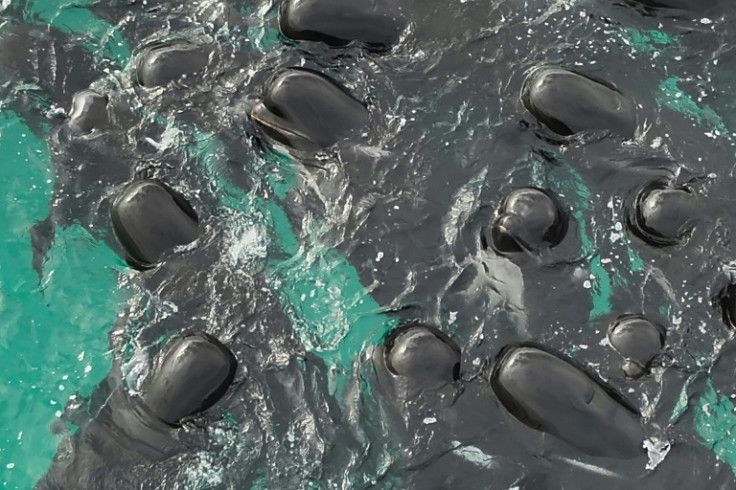More than 50 pilot whales die in mass stranding in Western Australia
Volunteers and authorities are racing against time to save the remaining whales

More than 50 pilot whales died after a mass stranding on a beach in Western Australia on Tuesday, as authorities rush to save the other stranded whales.
The pod of long-finned pilot whales was spotted at Cheynes Beach. The authorities launched an emergency response immediately after receiving information about the beached whales.
Volunteers and officers from the Parks and Wildlife Service are still at work to return the remaining 46 whales to deeper water, according to a report in The Guardian.
"We still have 46 whales still alive, and that will be our focus today — to get them back into the water and encourage them to head off into deeper water," Peter Hartley, a manager from Western Australia's state Department of Biodiversity, Conservation, and Attractions, told the Australian Broadcasting Corporation. "We are optimistic that we will save as many as we can."
The images and videos that have now gone viral on social media platforms show some extremely heart-wrenching scenes. The stranded whales could be seen lining up along the coastline at Cheynes Beach.
At least 51 whales have died in a mass stranding at Cheynes Beach in Western Australia, 46 others still at risk pic.twitter.com/UFN7M6YxB7
— BNO News (@BNONews) July 26, 2023
As seasonal migrations take place each year, pods with as many as 1,000 whales and dolphins move across Australia and New Zealand. Researchers say each pod follows a leader. Being highly social species, these sea creatures form a strong social bond, which can cause them to follow a stray leader, causing entire groups to get beached.
Beaching, or cetacean stranding, is the phenomenon of aquatic mammals stranding themselves on land, usually on a beach. As many as 2,000 mammals beach themselves accidentally every year. Whales that get beached often die of dehydration, collapse under their own weight, or drown when high tide covers their blowholes.
#Watch | Rescue operations continue at Western Australia's Cheynes beach to send 46 stranded whales into deeper waters. Nearly 100 whales were found stranded near the beach on July 25. 51 pilot whales lost their lives#Australia #WHALES #cnbctv18digital pic.twitter.com/DDgEdw8vaR
— CNBC-TV18 (@CNBCTV18News) July 26, 2023
Whales stranded on land dehydrate quickly without the water they are accustomed to. They easily suffocate under their own weight, which is normally supported by the water around them.
Unlike other beached mammals like dolphins, most stranded whales end up dying. Marine experts find it difficult to get the huge mammals back into the water before they die of dehydration or other issues.
Marine biologists and scientists also speculate that sonars from military boats may be interfering with the whales' brain wave activity, leading them to become disoriented or sick and forcing them to swim towards shallow waters, where they end up beaching themselves.
Ocean research has also shown that the navigation systems of naval vessels cause confusion in whales and dolphins since they use echolocation for their own navigation. They usually flee in such situations, which is thought to be a major cause of whale and dolphin strandings.
Scientists have previously found that elevated noise levels affect marine animals' ability to find and corral prey, communicate, or navigate properly. The researchers claim that even low levels of noise affected their hearing power
Changes caused by global warming are also thought to be a reason for the beaching of whales as they go into unfamiliar waters in search of food. Many whales also wash ashore after their deaths.
The biggest threats to their existence are collisions with ships and entanglement in fishing nets and equipment. According to the National Oceanic and Atmospheric Administration (NOAA), there have been 101 large whale vessel collisions since 2013 in the US West Coast Region.
In 2020, Macquarie Harbour was the scene of Australia's largest-ever mass stranding. Around 470 long-finned pilot whales were found scattered along two sandbars and stuck in the shallow waters on the west coast of the island.
In September last year, more than 200 whales were found stranded on the remote coast of Australia's island state of Tasmania.
The experts believe that the stranding may have been caused by the climate crisis. They believe that the whales were forced out of their natural habitat. Griffith University marine scientist Olaf Meynecke told Sky News that it was previously uncommon for sperm whales to wash ashore. He said that it could be because of warmer ocean temperatures.
© Copyright IBTimes 2025. All rights reserved.






















